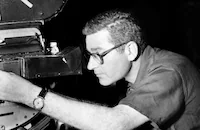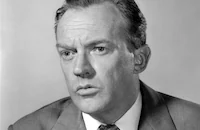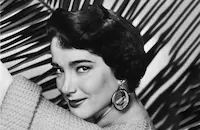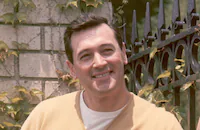Bright Victory

Brief Synopsis
Cast & Crew
Mark Robson
Arthur Kennedy
Peggy Dow
Julia Adams
James Edwards
Will Geer
Film Details
Technical Specs

Synopsis
In 1943, during World War II, Sergeant Larry Nevins is hit by German sniper fire in North Africa. He regains consciousness after he has been rescued and finds that his eyes are enclosed in a head dressing. He is sent back to the U.S. so that the damage to his eyes can be assessed. On the plane, Larry, a Southerner from the small town of Semolina in the northern part of Florida, chats amicably with a soldier from Atlanta, until he realizes that the other soldier is black. Larry then abruptly ends the conversation. At the Valley Forge General Hospital in Pennsylvania, where 2,000 blind soldiers learn to adjust to their condition, Larry is told that he will never see again. He makes his way to the bathroom, intending to cut his wrists, but is stopped by Corporal John Flagg. Lt. Atkins, Larry's superior officer, demands that he inform his parents of his condition, and when Larry refuses, threatens to tell them himself. Humiliated, Larry lets his mother know he is blind. Atkins then reveals that he, too, is blind, and Larry apologizes. During an obstacle test, Larry learns that he can sense a wall ahead of him before he reaches it. Excited about this newfound ability, he calls his mother to boast. Larry becomes friends with Joe Morgan, a soldier from New Orleans, who, unknown to Larry, is black. At a dance, he meets Judy Greene, whom he earlier insulted in a bar when he thought she was trying to pick him up. They spend an enjoyable evening together, but he admits that he has a girl friend, Chris Paterson, in Florida. The day before Joe is to leave for home on furlough, Larry comments that among the new men arriving the next day are three "niggers." Offended by Larry's bigotry, Joe reveals that he is black, and after Joe leaves, the other men in his ward stop speaking to Larry. When Larry complains that Joe should have told him he was black, Flagg asks if he intends to ask the race or religion of everyone he meets before deciding whether he likes them, and advises Larry to learn to trust what he feels about people. Two days before he is to visit his home, Larry spends a weekend at a cabin with Judy, her sister Janet, and Janet's husband, Bill Grayson. Bill, a Philadelphia lawyer, encourages Larry to study law, telling him of a colleague, Jess Coe, who has been blind since World War I and is one of the best trial lawyers in the city. Larry is unsure of his own capabilities, however. That night, Larry discovers for the first time that Judy loves him. When she kisses him, he pulls away, saying he still loves Chris and that he needs the security of a life with Chris, the daughter of a wealthy barrel manufacturer. Later, in Seminola, he rebukes his mother when she makes a disparaging remark about "our nigras." Alone with his father, Larry talks about his broken friendship with Joe and complains that his mother taught him her way of thinking about blacks. His father explains that she herself was taught by others to think that way and thanks his son for fighting in the war and helping to change the world. The next night, at Chris's party for him, Larry becomes upset when a clergyman suggests that a miracle may allow him to see. When he is alone with Chris, he asks that they take things slow and not talk about his blindness and their plans yet. During the month at home, Larry finds his small town less hospitable than Valley Forge, where people are used to living with the blind. Although he plans to marry Chris at Christmas, he does not want to accept a job in the Paterson barrel factory, which Chris's father plans to give him for his daughter's sake. A few days before he is to leave for Avon, Connecticut to learn an occupation, Larry tries to convince Chris that he would rather get his own job than accept one offered out of charity. After thinking about their situation, Chris says she is not strong enough for what he has in mind, and they break their engagement. On his way to Avon, Larry stops at the train station in Philadelphia, where Bill, to whom Larry sent a telegram, meets him and takes him to Coe's home. Coe tells Larry that he succeeded in law school because he was able to concentrate better than the other students, and because his dedicated wife read the law books, which were not available in Braille, aloud to him. Back at the station, Larry is disheartened that Judy, to whom he also sent a telegram, is not there, but she arrives just before the train leaves, and they hug. Larry admits he looked for security in the wrong place and realizes now that he has to make it for himself. They decide that they will find their way together, and that he will become a lawyer. At the train, Larry hears Joe's name. The two men agree to be friends, and sit together during the train trip to Avon.

Director

Mark Robson
Cast

Arthur Kennedy

Peggy Dow

Julia Adams

James Edwards

Will Geer

Nana Bryant

Jim Backus

Minor Watson
Joan Banks

Richard Egan
John Hudson
Marjorie Crossland
Donald Miele

Murray Hamilton

Larry Keating
Hugh Reilly
Mary Cooper

Rock Hudson
Ken Harvey
Russell Dennis
Phil Favershim
Robert F. Simon
Virginia Mullen
Ruth Esherick

Jerry Paris
Bernard Hamilton
Robert Anderson
June Whitley
Sydney Mason
Richard Karlan
Billy Newell
Glen Charles Gordon
Ted Jordan
Chester Jones
Thaddeus Jones
Paul Hoffman
Larry Winter
Dee Carroll
Terry Terrill
Grace Richey
Paul Robinson
J. Raymond Shipp
Robert Myers
Louis Morsbach
Freddie Marcellino
William Friedborn
William J. Drohan
Alvin Busch
Richard Houser
John M. Robinson
J. Walter Burns
Alice Richey
Sara Taft
Scotty Beal
Dick Gordon
Crew
John Austin
Robert Buckner
Robert Buckner
Howard Burton
Leslie I. Carey
Milton Carruth
Don Cunliffe
Edward Dodds
Russell A. Gausman
Bernard Herzbrun
Corson Jowett
Nathan Juran
George Lollier
Rosemary Odell
Russell Schoengarth
John Sherwood
Frank Skinner
Joan St. Oegger
Bert Tuttle
Les Warner
Bud Westmore

Videos
Movie Clip



Hosted Intro



Film Details
Technical Specs

Award Nominations
Best Actor
Best Sound
Articles
Bright Victory
Arthur Kennedy earned a Best Actor Oscar® nomination for his portrayal of Sergeant Larry Nevins, who is blinded by a German sniper's bullet in North Africa. (The movie's other Oscar® nod was for Sound Direction). During Nevins' rehabilitation, he learns to adapt to a world he cannot see with the help of beautiful but strong-willed nurse Judy (Peggy Dow), who refuses to let the veteran wallow in self-pity. Something that was once a simple task, like shaving every morning, now becomes a skill he has to re-learn step by step. During this learning process, Nevins must also re-think his views of race. His racism is put to the test by a fellow veteran at the hospital, played by the underrated black actor James Edwards (Home of the Brave (1949), The Manchurian Candidate, 1962).
When Nevins leaves the shelter of the hospital, he learns that although he is starting to accept his disability, others in his life -- including his hometown girlfriend played by Julie Adams -- have difficulty doing so. Bitterness returns but Nevins ultimately decides to go back to the hospital and Judy and face the long struggle to acceptance with his blindness.
Though often restricted to Western roles, Kennedy got a chance to utilize his genuine acting skill with some heavy-hitting movies, such as Bright Victory, Champion (1949), Elmer Gantry (1960), and Lawrence of Arabia (1962). He never won an Oscar® but was nominated five times, losing to Humphrey Bogart in The African Queen the year he was nominated for Bright Victory. Kennedy got his start playing Shakespeare in various American theaters, and would later be among original casts for Arthur Miller stage productions, including Death of a Salesman.
To get into character as the blinded veteran in Bright Victory, Kennedy wore black contact lenses to obscure his sight and experience the loss of one of his senses. Critics hailed the resulting performance, and -- even though the Academy Award eluded him -- he won other acting trophies, including that year's New York Film Critics Circle Award.
Dow, who played the nurse who falls in love with the blinded Nevins, was once a medical student in real life. Getting her start on the big screen in 1949, she quickly landed high-profile roles in movies such as Harvey (1950) and You Never Can Tell, (1951) but left her burgeoning career after marriage. Rock Hudson also makes a small appearance in Bright Victory, receiving 18th billing for playing a corporal.
To make Bright Victory as realistic as possible, director Mark Robson (The Bridges at Toko-Ri, 1955, Peyton Place, 1957) filmed many scenes on location at the U.S. Army General Hospital in Pennsylvania and hired some of the blind veterans there as extras and film advisers. The director's even hand and Kennedy's Oscar®-nominated performance resulted in a film that tackles the subjects of disability and racism with dignity and one that still resonates with viewers more than 50 years later.
Producer: Robert Buckner
Director: Mark Robson
Screenplay: Robert Buckner, Baynard Kendrick (novel)
Cinematography: William H. Daniels
Film Editing: Russell Schoengarth
Art Direction: Bernard Herzbrun, Nathan Juran
Music: Frank Skinner
Cast: Arthur Kennedy (Larry Nevins), Peggy Dow (Judy Greene), Julie Adams (Chris Paterson), James Edwards (Joe Morgan), Will Greer (Mr. Nevins), Nana Bryant (Mrs. Nevins), Rock Hudson (Corporal John Flagg).
BW-98m. Closed captioning.
by Amy Cox

Bright Victory
Quotes
Trivia
Notes
The working title of this film was Lights Out. According to a Hollywood Reporter news item, in March 1946, David W. Siegel and producer-director Robert Thoeren considered forming a partnership to make a film based on Baynard Kendrick's novel, which was a best-seller. Kendrick had earlier written a detective series, featuring "sightless detective" Duncan Maclain. The accuracy of that portrayal led Kendrick to be recommended to the War Department to help in the rehabilitation of blind veterans, and that work led to his writing Lights Out. Los Angeles Times reported in August 1946 that the novel was "as good as bought" by M-G-M, which had produced two films featuring Kendrick's Duncan Maclain character, Eyes in the Night (1942) and The Hidden Eye (1945; see the AFI Catalog of Feature Films, 1941-50), although the studio denied the deal. According to New York Times, the screen rights to the novel were bought in 1946 by Clarence Brown for $10,000. Brown then sold them the next year for $50,000 to Robert Montgomery, who had recently become associated with Universal-International.
Montgomery planned to direct and star in the film, with Joan Harrison writing the screenplay and producing. In March 1947, New York Times reported, "The color problem will not loom as large on the screen as it did in the novel, according to Miss Harrison, since the love story will be the primary subject in the screen treatment. On the other hand, she declared, sectional prejudice in the United States will not prevent the studio from facing the Negro question on the screen, although box-office dictates have previously blocked all examination of the subject." The film ultimately was produced and written by Robert Buckner, who, according to New York Times, said he found it necessary to change certain aspects of the book; author Kendrick nevertheless praised the resulting film. According to information in the MPAA/PCA Collection at the AMPAS Library, in May 1950, PCA director Joseph I. Breen, after examining a draft of the screenplay, advised, "The two uses of the word 'niggers' are likely to prove offensive, and we seriously recommend that you substitute the word 'Negroes.'" The studio, however, kept the word in the film.
Extensive filming was done at the United States Army General Hospital at Valley Forge, PA, which, according to New York Times, Kendrick had in mind when he wrote the novel. Ten blind World War II veterans at the hospital appeared as extras and advised the actors. Hollywood Reporter news items add Tod Wilmer to the cast, but his appearance in the final film has not been confirmed. New York Times stated that Arthur Kennedy, like director Mark Robson, was "devoted to realism" and noted that Kennedy acted the role wearing contact lenses that had been dyed black. Universal-International borrowed Robson from Samuel Goldwyn for the film. Scenes were also shot on location in Northridge, CA, Florida and Philadelphia, PA.
Cue praised the film as "one of the year's most distinguished." Reviews were mixed concerning the film's treatment of racism. Time wrote, "Not content with solving the problems of the blind hero so easily, Bright Victory is even more superficial in an over-tricky subplot that as glibly poses and solves the Negro problem." Hollywood Citizen-News commented, "Bright Victory would have been stronger, story-wise, and boast greater unity if Negro discrimination ... had not been touched upon." However, Los Angeles Times praised the film, stating, "The racial issue that arises ... is very ably depicted and is an important component of the plot." Saturday Review (of Literature) praised the acting of James Edwards, saying he "gives the role dignity and dimension." Concerning the realism of the film's hospital scenes, New York Times applauded the "fine documentation of the techniques by which blinded veterans are treated and trained at an Army hospital." The film received a number of awards and citations, including the Distinguished Service Award of the President's Committee for Employment of the Physical Handicapped and the Veteran of Foreign War's National Citation. The film received Academy Award nominations in the Best Actor (Arthur Kennedy) and Sound Recording categories.














